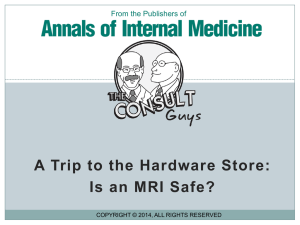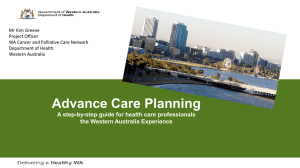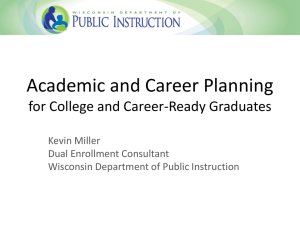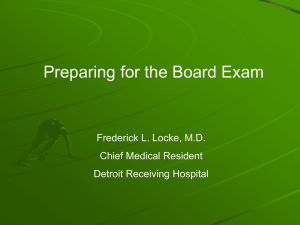ACP in Dementia 2012 (pptx format)
advertisement
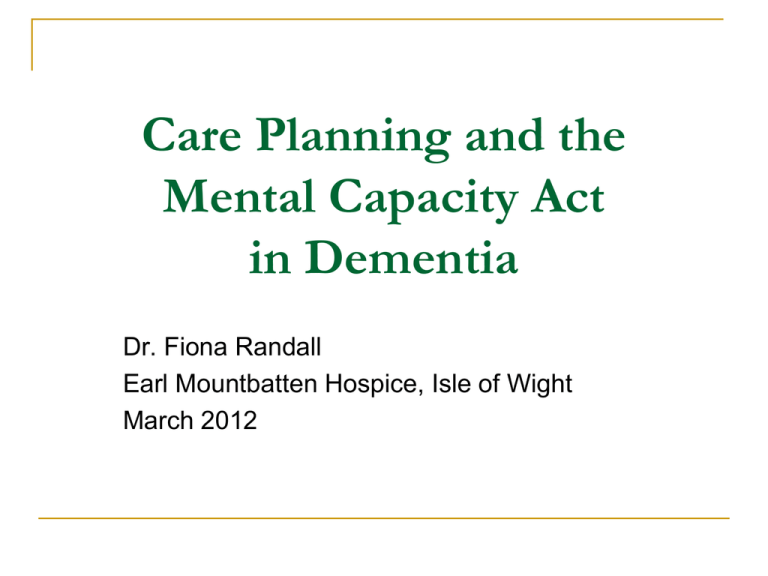
Care Planning and the Mental Capacity Act in Dementia Dr. Fiona Randall Earl Mountbatten Hospice, Isle of Wight March 2012 1 Why this topic ? EoLC Strategy: every patient to be offered a ‘care plan’ Relatively new terms/concepts - ‘care planning’ and ‘advance care planning’ (ACP) as interventions. Care planning relevant to dementia, ACP less often. Lack of clarity regarding nature of both interventions. Lack of understanding of how the Mental Capacity Act (MCA) influences care planning and advance care planning Lack of understanding of integral link between ACP and the MCA. All leading to poor practice in care planning and ACP. Political & professional pressure to implement both. 2 Law and professional guidance Mental Capacity Act 2005 Code of Practice (guidance for public and professionals) - This is effectively law so is not negotiable! National End of life Care Programme 2011 on ‘Capacity, care planning and advance care planning in life limiting illness’ - A guide for health & social care staff. Online only General Medical Council (GMC) guidance on decision making in end of life care 2010. What we will cover The test for decision-specific capacity and its centrality in decision making in dementia. Dispel myths regarding ACP; its relationship to MCA Distinction between decision-making versus care planning for the future Definition of care planning and issues arising ACP: definitions and issues arising; benefits, harms and risks; professional guidance Overall ethical issues for us and the NHS 4 Decision specific test for capacity Decision making capacity is assumed unless judged lacking following the test Stage 1: does the person (P) have an impairment or disturbance of the mind or brain? If the answer is yes:- Stage 2: is that impairment sufficient to mean that P is unable to make a decision for himself P lacks capacity if he cannot understand relevant information, retain it, or weigh it up, or communicate his decision by any means. 5 Two distinct paths for decision making If P has capacity for the decision in question, then decision making is via the consent process with P. If P lacks capacity, then, (unless an Lasting Power of Attorney (LPA) was previously appointed for that decision), the process is by making a best interests judgement on P’s behalf, following the MCA process Consider all the relevant circumstances plus whatever can be known of P’s wishes, feelings, beliefs and values. What is ACP about? ACP always done with patients who have mental capacity to establish and express preferences. So ACP cannot be done by those already severely demented, or moderately demented and lacking capacity regarding the issues under discussion. Always been about patients with capacity expressing preferences in advance of loss of capacity in order to aid decision making only when their capacity is later lost; then it informs decision makers regarding what P’s wishes might have been. 7 Relationship of ACP to MCA UK: ACP intimately related to MCA regarding decision making for patients lacking capacity ACP outcomes: advance statement; Advance decision to refuse treatment (ADRT); LPA appointment Any written statement must be taken into account in a best interests judgment for the patient lacking capacity, including (but not limited to) advance statements. Statute law enabled ADRT for specified treatment, and appointment of LPA for health and welfare. 8 ACP: Serious misunderstandings Ubiquitous error: ‘advanced’ care planning, even ‘advanced decision’, BMJ 2011;342:d2110 and ‘advanced directive’, Minerva, BMJ 11.6.2011 Error of understanding – not ‘super’ care planning, nor by those with ‘advanced’ skills! What is care planning, what is a care plan? Failure to distinguish ACP from care planning which is not ACP: severely demented cannot do ACP, yet Pall Med 25(3) 197-209 published ‘ACP intervention’ for people already severely demented. - This was care planning, not ACP! 9 ACP is a subset of care planning Outcomes of ACP are advance statement, ADRT, LPA. Patients can achieve these three outcomes without ACP, though not advisable Care Planning ACP 10 Decision making v. care planning for the future Decisions: actually made only at the time when they are needed, (except ADRT by patient, binding later if valid and applicable) Decisions cannot be made now for future time and circumstances; can only make a plan Even ‘DNAR order’ is only advisory to decision maker at the time. Neither a previous ‘care plan’ nor a medical plan regarding treatment escalation is binding on actual decision maker at the time. Law, HC ethics & GMC are about decision making now, not care planning, (for now or for the future). 11 What is ‘care planning’ ? – National End of Life Care Programme 2011 ‘Care planning embraces the care of people with and without capacity to make their own decisions. It involves a process of assessment and person centre dialogue to establish the person’s needs, preferences and goals of care and making decisions about how to meet these in the context of available resources. It can be oriented towards meeting immediate needs, as well as predicting future needs and making appropriate arrangements for contingency plans to address these.’ 12 Care Planning issues arising - 1 The definition fails to distinguish between processes for patients with and without capacity, as stipulated in law and professional guidance. It fails to distinguish between decision making now and care planning for the future; these are ethically/legally different concepts. Law & professional guidance relate to decision making when the decision is needed, (not for future). Care planning - confusing; tries to make one concept work for decision making now and also future care planning. 13 Care Planning issues arising - 2 Surely care planning for ‘immediate needs’ of a person (P) with dementia is effectively the consent process if P retains capacity, and is the best interests process if P lacks capacity for the decision needed now. Participation in care planning is ‘voluntary’ (NEoLC Programme) If a person with capacity declines to participate in care planning, ‘their adequately informed consent must be gained’ regarding any decisions ‘that result from care planning.’ But if a person with capacity declines care planning, how can care planning take place, and so how can any decisions result from it? 14 Care Planning issues arising - 3 Care plan ‘documents the care and treatment actions necessary to meet a person’s needs, preferences and goals of care. These must have been agreed with the person receiving care or by those acting in the person’s best interests.’ Care plan requires agreement of patient, or those close to patient if lacking capacity. Consider in dementia. Different from medical decision making: when doctor judges that an intervention is clinically inappropriate as harm and risk outweighs benefit, then a decision can be made without patient agreement. This is because doctor decides what treatment options to offer patient with capacity, or consider for patient lacking capacity. 15 Broader ethical issues arising NEoLC programme definition and NEoLC strategy imply that preferences will be met via the care planning process and care plan ‘A care plan will be offered to every patient and carer, to help ensure services are provided to meet their needs and preferences.’ my italics Patient / carer conflict, notably in dementia; choice v cost-effectiveness; justice; professional responsibility (for benefit>risk and harm and resource allocation). 16 EoLC Strategy issues… ‘All people approaching the end of life need to have their needs assessed, their wishes and preferences discussed and an agreed set of actions reflecting the choices they make about their care recorded in a care plan.’ NEoLC strategy under care planning heading, exec summary, my italics. Dementia/loss of capacity largely ignored Voluntariness regarding discussing future; patient/carer conflict Choices; choice v. cost effectiveness; justice; can we afford to comply with all those ‘choices’ in dementia? Professional responsibility – treatment decisions will not be based merely on previously expressed ‘choice’. 17 ACP: GMC definition Part 1 ‘The process of discussing the type of treatment and care that a patient would or would not wish to receive in the event that they lose capacity to decide or are unable to express a preference, for example……..’ OK so far, and is clearly about only planning for future loss of capacity. 18 ACP: GMC definition Part 2 ‘It seeks to create a record of a patient’s wishes and values, preferences and decisions, to ensure that care is planned and delivered in a way that meets their needs and involves and meets the needs of those close to the patient.’ my italics Not OK! Only ‘decision’ possible for future is ADRT ‘Ensure that care is…delivered in a way that meets their needs’: a plan doesn’t guarantee a future treatment or care Family involved only if patient wants them to be ACP is about needs of patient, not ‘those close to the patient’ 19 ACP: NEoLC Programme definition ‘A voluntary process of discussion and review to help an individual who has capacity to anticipate how their condition may affect them in the future and if they wish, set on record: choices about their care and treatment and/or an ADRT in specific circumstances, so that these can be referred to by those responsible for their care or treatment, (whether professional staff or family carers), in the event that they lose capacity to decide once their illness progresses.’ my italics 20 Issues with NEoLC definition Use of term ‘choices’ as opposed to ‘preferences’ implies that patient can actually choose future care and treatment But this implication is incorrect as patients can receive only treatment and care that staff consider clinically appropriate/overall benefit at the time The term ‘choice’ implies you can make a decision now about what will happen to you in the future, but (apart from ADRT) you can’t, so misleading. RCP on ACP: it can’t guarantee a future treatment/care ADRT: must specify treatment, ‘may’ specify circs. 21 ACP: When? NEoLC Programme: ‘following diagnosis of a life limiting condition’. But at diagnosis of dementia, Patient may already lack capacity for some ACP issues! But RCP e-b guidance: time will depend on prognosis, pattern of disease progression & patient willingness to engage – clinical judgment needed. But RCP note: ‘ACP discussions should be initiated in primary care or in the outpatient setting before individuals become acutely unwell.’ Generally not advised as in-patient in acute hospital situation. 22 ACP: Who? RCP note: ‘the professional should have adequate knowledge about the disease, treatment and the particular individual to be able to give the patient all the information needed to express their preferences…’ NEoLC Programme: agree that staff must have ‘adequate knowledge of the benefits, harms and risks associated with treatment or care options to enable a person to make an informed decision’. 23 ACP: What information Compare with consent; regarding future treatment options patient will need essentially the same information as would be needed for consent in dementia Ways of dying content: pneumonia; hospitalisation issues; reduced food intake. Regarding place of care and of death; patient (and family if involved in discussion), need honest information regarding what services are available RCP notes: individuals should be advised that ACP ‘does not guarantee that their wishes will be respected’ apart from valid & applicable ADRT 24 Potential benefits ACP in dementia Provides info about patient’s wishes/ feelings/beliefs/ values So patients are more likely to receive the treatment and care (locations) they wish, once capacity is lost. Avoid interventions patient wouldn’t want. Avoid waste of resources, (acute admissions). NEoLC Programme state limited evidence for; - increased sense of control/hope - enhanced relationships - aid ‘transition to palliative care’ - increased satisfaction of bereaved carers. 25 Potential harms to patients - 1 Emotional trauma: loss of mental capacity and independence is difficult or distressing to contemplate Information about future illness scenarios is often unpleasant, (ways of dying content). Family conflict: if family involved, patient and family may disagree regarding future treatment and especially place of care. Patient’s views are the priority – not clear in GMC definition or GSF Thinking Ahead document 26 Potential harms to patients - 2 Poor process of ACP intervention due to lack of staff time, knowledge or skills – quality of ACP almost entirely operator-dependent. Confusion between care planning and ACP Confusion regarding what ACP is, plus it is a difficult intervention (timing, information, communication), so sub-optimal process more likely leading to overall harm. 27 Potential harms to patients - 3 Threats to voluntariness: political drive for ‘choice’, quality markers regarding place of care, professional idealism, all likely to lead to pressure/coercion to undertake ACP in dementia and to make an advance statement. Confidentiality breaches: widespread misunderstanding that it is views of family which are also sought, encouragement to ‘share’ advance statements between providers, little regarding confidentiality in new NEoLC Programme guidance. 28 Potential risks for patients - 1 Failure of patient to understand importance of advance statement and that it will be used. Unrealistic expectations, especially from NEoLC wording regarding ‘choices’. Unrealistic expectations of family if involved. Failure to update, so current views misrepresented. 29 Potential risks for patients - 2 Inadequately informed preferences: worse than no advance statement, but may happen as info may not be given as complex, often unpleasant and time resources needed. Stress on achieving preferred place of death as percentage % (quality marker): patients may be pressurised into expressing ‘achievable’ choices Or moved when imminently dying to place of their choice, or ‘out of hospital’, including to improve hospital mortality figures! 30 Care planning benefits Care and treatment more likely to accord with patient’s best interests once capacity is lost May increase carer satisfaction. Gives focus on patient’s wishes when has capacity. May avoid ‘crisis management’ and sub-optimal decision making, especially out of hours. May avoid waste of resources e.g. clinically inappropriate admission to hospital Care Planning harms/risks Unrealistic expectations of patient and carers Patient / carer conflict. Carer guilt if plan not later implemented. Failure patient and carers to understand only a plan, so best interests decision will be needed later. Misunderstanding by staff: may adhere to ‘plan’ rather than make appropriate decision ‘now’ on basis of best interests Overall ethical issues for us & NHS Cost-effectiveness: what patients and carers prefer / choose may be more costly in manpower and money than alternatives; opportunity cost to others Justice: finite resources ought to be allocated according to clinical need, not choice. Legitimate needs of other patients may be overridden by imperative to meet preferences of those with advance statements. Poor practice: due to confusion (re: care planning and ACP) + NHS directives regarding care planning. Do we really understand what care planning is and how to make a care plan; are we offering care plans? 33


